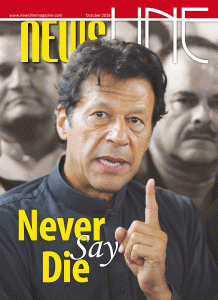Editor’s Note: October 2016
By Rehana Hakim | Newsbeat National | Published 8 years ago
 The Indo-Pak border is resounding with the sound of gunfire. Is a conflagration between the two nuclear-armed states on the anvil?
The Indo-Pak border is resounding with the sound of gunfire. Is a conflagration between the two nuclear-armed states on the anvil?
The Indian Prime Minister is certainly on the warpath, following the killing of 18 soldiers in Uri in Indian-administered Kashmir, allegedly at the hands of militants from across the border.
Pakistan was hoping to turn the spotlight on India for its blatant excesses in the Valley, including the killing of 100 or so Kashmiris and the blinding of several hundred Kashmiri youth by pellet gun-wielding Indian security forces.
But then Uri happened and the death of the Indian soldiers resonated with the world. And the blood of the hapless Kashmiris was all but forgotten as India’s blame game began. Unfortunately, Pakistan’s reputation as a sponsor of terrorism precedes it — Zarb-e-Azb notwithstanding, the stigma remains. And no matter how strongly Prime Minister Nawaz Sharif may have pleaded the Kashmiri cause or projected India’s blatant interference in Balochistan at the UN General Assembly session in New York, it was India’s story that won the day. In the new world order, India, with its booming economy and its huge market, is the current darling of the world — and, more specfically, the US — and that is a reality Pakistan will have to learn to live with.
India is well aware of its position, and is using it to its advantage. It pulled out of the SAARC Summit scheduled for November in Islamabad, and took alongwith it Bangladesh, Bhutan and its new-found friend, Afghanistan — making good on its promise of isolating Pakistan internationally. It threatened to water-starve Pakistan, already a water-stressed country, by suspending the biannual Indus Water Commission meeting and ordering that India fast-forward its hydropower projects on the three rivers designated for Pakistan’s exclusive use — an act that could precipitate into a war. Also, it is considering revoking the Most Favoured Nation status accorded to Pakistan.
An ugly war of words rages on between Pakistan and India, and Track 1, Track II, SAFMA, SAWM, SAHR and all such laudable peace initiatives have fallen by the wayside. Social media is spilling over with hate-filled sound bytes. But most disturbing in this tense scenario is the role of journalists — and more so on the Indian side — who have turned jingoists and are baying for each other’s blood.
An Indian TV channel, which was airing Pakistani plays in an effort to forge better understanding between the two neighbours, has pulled the plug. Additionally, the Mumbai-based Indian Motion Picture Producers Association passed a resolution to ban Pakistani actors from the industry and Hindu extremists asked Pakistani actors to leave the country or face grave consequences. In a tit-for-tat response, Pakistani cinema houses have stopped screening Indian movies.
When and how will all this bitterness and acrimony end?
The fate of 186 million Pakistanis and 1.3 billion Indians, most of whom live life on the fringes, lies in the hands of those at the helm, those who call the shots.
Will they step back and de-escalate, or are we destined to relive the horrors of Hiroshima and Nagasaki?
Rehana Hakim is one of the core team of journalists that helped start Newsline. She has been the editor-in-chief since 1996.
No more posts to load


